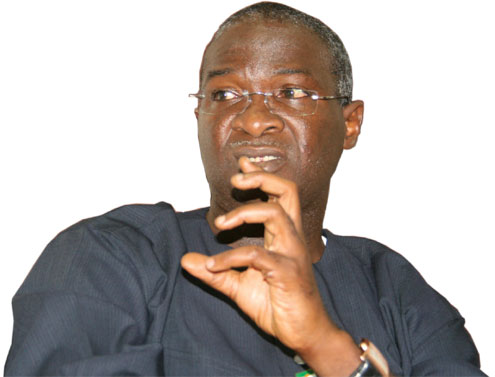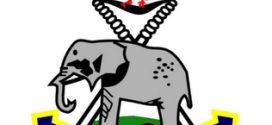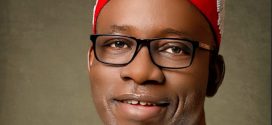 Lagos State Governor, Mr. Babatunde Fashola (SAN), Wednesday urged Nigerians to reflect on the past successes associated with Nigeria as a nation in order to find the right inspiration towards rebuilding of country.
Lagos State Governor, Mr. Babatunde Fashola (SAN), Wednesday urged Nigerians to reflect on the past successes associated with Nigeria as a nation in order to find the right inspiration towards rebuilding of country.
Fashola, who spoke as Guest of Honour at the Metropolitan Club, Victoria Island, venue of the Public Presentation of the books, “The Life and Times of James Pinson Labujo Davies” and “Worthy in Character and Learning” written by Professor Adeyemo Elebute, said such reflection would also reawaken their patriotism as Nigerians.
He told the audience of distinguished members of the Club comprising legal luminaries, captains of industry, traditional rulers and top government functionaries, that no matter the challenges confronting the country today, the knowledge that the nation has had a glorious past would add impetus to the will to overcome the present challenges.
The Governor declared, “We must continue to reflect about from where we came, all of the successes that we have had here before and, therefore, whatever challenges that we do face as a people today, we must remember from yesterday’s successes, that we did it before and we can find it in us to do it again”.
Expressing dismay that the country has moved away from learning resulting in the present developmental challenges being experienced, Governor Fashola said the sooner the nation returns to the path of learning the better for her adding that it is only by useful knowledge that Nigerians would be liberated.
Nigerians, the Governor said, must learn to place more value on what people know and what they can do than what they have and how many titles they hold adding that such knowledge would liberate the people from ignorance and set them on the path of success as already shown in the course of national development.
“I have urged that we would be a better people going forward if we place more value , as it was when I was a child, if we place more value today on what people knew and what they can do rather than what they own and how many titles they had”.
“So, learning, clearly, will liberate us. It has shown its value in our development and perhaps as we moved away from learning, whether by accident or by developmental limitations, we have found going forward a little more challenging and I think the quicker we return to learning the better we will be”, he said.
Commenting on the first book, “The Life and Times of James Pinson Labulo Davies” , Governor Fashola said it has revealed and reaffirmed the things that he knew about the strategic role of the Islands of Lagos in the history and development of the country as a nation and West Africa as a whole.
“The important things for me today are the perspectives that I shared in the book on Davies’ life and how it reveals very clearly or reaffirms the things that I know about the strategic role of the Islands of Lagos in the history and development of the Nigerian nation and also West Africa as a whole”, the Governor said.
He noted that such knowledge and enlightenment as portrayed by the book would enable “those who seek, either out of ignorance or out of mischief or a combination of both, if that is possible, to reverse the history of who we were and how we got here, to have a rethink”.
The Governor gave an insight into the illumination provided by the book on the historical evolution of the country saying, “First, it confirms very clearly to me that but for the resources of Lagos there may never have been a Southern Protectorate amalgamation with the Colony of Lagos”.
“And those who have been privileged to read the Memoirs of Lord Lugard would discover that in the memo he wrote seeking authorization to amalgamate the Southern and Northern Protectorates of Nigeria, we see very clearly that it was because it was impossible to run the two Protectorates financially and, therefore, they sought to use money generated from Lagos in order to administer the country”, the Governor said.
He said the history of how cocoa came into this land and travelled all the way to Ekiti has opened itself to better understanding in the book. Other areas in the Nigerian history opened up by the book, the Governor said, include the “part that brings to mind the attempt to change the name of the street that was dedicated in his honour” adding that it re-enforces his belief that street names should never be bought.
He declared, “They must be earned as token of service to the community. We are currently working with the local governments to see what could be done given the difficulties that exist in our Constitution today, about local government and street naming. Our view is that really street naming initiatives, especially very historic streets, must go to Parliament and be debated before such changes are made”.
Describing as “a great disservice to the nation’s history” the action of those who have renamed many parts of Ikoyi and Central Lagos after themselves, the Governor declared, “In my very humble view, they have done a very great disservice to our history; because, for me, the history of this country is still unfolding and there will be many more streets and towns and communities that can be named after those who truly serve instead of unearthing what existed”.
“And how can we then be able to explain to our children what really happened in those places when we have changed all the names. But I hope that we will have a rethink and do what is needful”, he said.
The Governor also pledged to return History as a subject to the curriculum of schools in the State saying a lot of work was underway about not only the history of Lagos but the history of Nigeria, West Africa and Africa itself. “My knowledge of History has helped me profoundly in the choices that I have had to make. So History will be back in our schools in the event”, he said.
Commending the author for his well-researched work in the two books, the Governor praised his “very versatile mind in the way he had made a success of almost everything that I know that he has laid his hands upon”, adding, “He has actually demonstrated a sense of excellence and success”.
He also urged Lagosians to visit the State’s Records and Archives Home at Magodo in Ikeja saying visiting and also registering as a member to make use of its library would be a rich connection with History.
In his remarks earlier, author of the books, Professor Adeyemo Elebute, implored the Governor to ensure that History returned to the curriculum of the State’s schools arguing that no one would love a country that he or she knew nothing about. “Patriotism must have a base in history”, he said.
In his welcome address, the Chairman of the occasion, Mr. Fola Adeola, congratulated the author for a well-researched work adding that the life and times of James Pinson Labulo, the descendant of a Yoruba slave, who was adopted into English Royalty by Queen Victoria, as elucidated by the author, was also a true reflection of the history of Victorian Lagos.
The first book, “The Life and Times of James Pinson Labulo Davies”, was reviewed by the Executive Secretary of the Lagos State Security Trust Fund, Mr. Fola Arthur-Worrey while the second book, “Worthy in Character and Learning”, was reviewed by former Pro-Chancellor of Bauchi and Abuja Universities, Mrs. Gbolahan Abisogun Alo. The books were presented by Chairman Macmillan Nigeria Publishers Limited, Mr. Olabode Emmanuel.
Some of the highlights of the occasion include the rendering of a Piano recital of a Yoruba Folklore song, “OLOBA” supplied by Mrs. Victoria Randle, nee Davies, to the famous Black British composer Samuel Coleridge-Taylor, recited and sang at the occasion by Biodun Falode and Martins Osuho and the unveiling of the books by Governor Fashola accompanied by HRM, Oba Akiolu 1 and members of the Davies family.
Also present at the well attended occasion were the Oba of Lagos, His Royal Majesty, Oba Rilwan Babatunde Akiolu 1, former Nigerian High Commissioner to the United Kingdom, Dr. Christopher Kolade, former Attorney General and Commissioner for Justice of Lagos State, Mr. Olasupo Shasore (SAN), Chief Molade Okoya-Thomas and other captains of industry as well as serving and retired legal luminaries and top government functionaries.
 Hottestgistnaija.com
Hottestgistnaija.com





